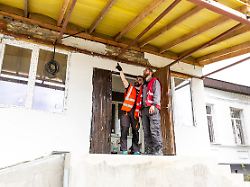Investments from Germany
How the reconstruction of Ukraine is slowed down
By Laura Esslinger
06/25/2023, 4:11 p.m
The longer the war of aggression in Ukraine lasts, the higher the cost of reconstruction will be. However, many companies do not dare to invest large sums in a country at war. The government now wants to change that.
Several billion dollars are to flow into the reconstruction of Ukraine. At a conference in London, delegates from more than 60 participating countries confirmed this. According to the World Bank, after a year of war, Ukraine would need 383 billion euros to rebuild its infrastructure over the next ten years. However, the figure is only an estimate from March. With every day that the Russian war of aggression continues, this sum increases.
For this year alone, the World Bank estimates the reconstruction costs at around 12.8 billion euros. The money that the participants of the “Ukraine Recovery Conference” have now agreed on is to be covered by private and public investments.
US Secretary of State Antony Blinken has pledged around 1.1 billion euros in aid, around half of which will go towards repairing the Ukrainian energy grid. According to Commission President Ursula von der Leyen, the EU wants to contribute 50 billion euros by 2027. 280 million euros in aid and 3.5 billion euros in loan guarantees from the World Bank are to come from Great Britain. Federal Foreign Minister Annalena Baerbock pledged 381 million euros from Germany.
Virgin and Philips want to invest
However, the political representatives in London also made it clear that the private sector must invest in Ukraine in order to help it economically. However, many companies are reluctant because the investment risk in a war zone is extremely high. Federal Chancellor Olaf Scholz tried last autumn to convince business to get involved. At the German-Ukrainian Economic Forum he said that without the companies nothing would work.
The Eastern Committee of German Business is also dealing with the question of how companies can be persuaded to invest in Ukraine. “As long as the fighting continues, we will not be able to speak of a large wave of new investments. First of all, it is about keeping the companies running that are already there,” said the committee chairman Florian Harms of the Tagesschau at the time.
In many countries, the persuasion work is already further along: According to British Prime Minister Rishi Sunak, more than 400 companies from 38 countries have agreed to invest in Ukraine, including British Telecommunications, Virgin, Philips and Hyundai Engineering. The AP news agency quoted him as saying that the country offers a huge investment opportunity despite the increasing destruction caused by Russian attacks.
Great Britain also hopes that the conference participants will also make progress with the planned development of a so-called war risk insurance for companies. The idea behind this is that banks and reinsurers cushion the risk of war-related losses.
Hermes guarantees should do it in Germany
So far, investing companies have been poorly protected. If a company becomes active in a war zone, normal insurance contracts, such as those against accidents, do not apply; the same applies to employee insurance.
Companies have therefore had to take out war cover, which is very expensive. “For a medium-sized company that just wants to send a salesperson to Ukraine for a few days, this is often a major insurance challenge,” quotes the Tagesschau security consultant Friedrich Christian Haas from the company Ake Skabe.
The Federal Ministry of Economics (BMWK) therefore wants to encourage companies to invest with so-called export credit guarantees, also known as Hermes Cover. The insurer is Euler Hermes AG, which is now called Allianz Trade. This type of protection comes into play when investments are lost. According to the BMWK, they have existed in foreign trade promotion for decades. “They protect exporters and banks against payment defaults caused by economic and political factors. The cover offered covers the entire value chain – from production to delivery to payment of the last installment,” says the ministry.
If a German company invested in the Ukraine is threatened with default, the Federal Republic of Germany would be largely liable in case of doubt. The company has to pay a “risk-adequate premium” for this. In the event of damage, the federal government pays the company the sum that it insured.
According to the BMWK, small and medium-sized enterprises (SMEs) are particularly eligible for funding. In 2022, the federal government provided export credit guarantees for investments amounting to 14.9 billion euros.
You can read more about the topic online at Capital.de read. The new print edition has been available since January 23rd kiosk available.
Since the war in Ukraine, the Federal Republic has no longer secured investments in Russia and Belarus. After Turkey and Russia (until February 24), Ukraine is the country for which the federal government covers the most transactions: the coverage amounted to 144 million euros in 2022, in 2021 the federal government still had 650 for investments in Ukraine million euros guaranteed.
Companies have another option for hedging with the European Bank for Reconstruction and Development (EBRD). They can secure exports via the Trade Facilitation Program. In 2022, the EBRD granted loans with a volume of EUR 1.7 billion. The Kreditanstalt für Wiederaufbau (KfW) also promotes investments: Two funds from Finance in Motion, an impact asset manager of the KfW banking group, invest in climate protection projects and medium-sized companies.
Meanwhile, private banks also want to get involved: According to the “Financial Times”, JP Morgan and Blackrock are planning to set up a bank for the reconstruction of Ukraine. Public capital is to be invested in reconstruction projects through them – in the hope that private investors’ money will then also be collected. This is also being negotiated in London.
